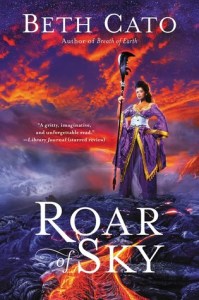The Leaning Pile of Books is a feature where I discuss books I got over the last week—old or new, bought or received in the mail for review consideration (often these are unsolicited books from publishers). Since I hope you will find new books you’re interested in reading in these posts, I try to be as informative as possible. If I can find them, links to excerpts, author’s websites, and places where you can find more information on the book are included.
This is the third week in a row of catching up on coverage of new book arrivals, but this feature should resume normally next week (assuming nothing too unexpected happens again!).
There were no new reviews last week; however, I did nearly finish one last week so I expect a new one to be up soon.
Now, here are the rest of the ARCs/review copies that came in while things were unusually chaotic.
The Gutter Prayer (Black Iron Legacy #1) by Gareth Hanrahan
This debut fantasy novel about three thieves will be released on January 22, 2019 (trade paperback, ebook).
A sequel titled The Divine Machine will follow.
A group of three young thieves are pulled into a centuries old magical war between ancient beings, mages, and humanity in this wildly original debut epic fantasy.
The city has always been. The city must finally end.
When three thieves – an orphan, a ghoul, and a cursed man – are betrayed by the master of the thieves guild, their quest for revenge uncovers dark truths about their city and exposes a dangerous conspiracy, the seeds of which were sown long before they were born.
Cari is a drifter whose past and future are darker than she can know.
Rat is a Ghoul, whose people haunt the city’s underworld.
Spar is a Stone Man, subject to a terrible disease that is slowly petrifying his flesh.
Chance has brought them together, but their friendship could be all that stands in the way of total armageddon.
The Dream Gatherer: A Green Rider Novella by Kristen Britain
This collection, which contains the novella “The Dream Gatherer” plus two additional short stories set in the Green Rider world, is out now (hardcover, ebook, audiobook).
The publisher’s website has an excerpt from The Dream Gatherer.
Celebrating the 20th anniversary of the New York Times bestselling Green Rider series, this short volume introduces readers to new sides of Sacoridia in two new short stories and a novella.
In The Dream Gatherer, Kristen Britain presents a novella and two short stories set in the universe of her best selling Green Rider series in celebration of the twentieth anniversary of the publication of her first novel, Green Rider.
The Dream Gatherer
Dreams can be dangerous. A visit with the eccentric Berry sisters turns dangerous when an arcane device is discovered in their house that can summon dreamers through their dreams, and one of them is a nightmare.
Wishwind
Finding peace during the Long War. Raised in an orphan camp, Green Rider Danalong has known only war and strife, until a shipwreck leaves him stranded on a mysterious island.
Linked, on the Lake of Souls
A story of friendship within a story of friendship. In the sixth volume of the Green Rider series, Firebrand, a wounded Karigan G’ladheon asks her friend Estral to tell her a story to take her mind off her pain. This is that story.
The book includes illustrations and backstory on the creation of Green Rider by the author, and a special introduction by award-winning science fiction and fantasy author, Julie E. Czerneda.
The Way of the Shield (Maradaine Elite #1) by Marshall Ryan Maresca
The beginning of the fourth series set in the world of the Maradaine Saga is out now (mass market paperback, ebook).
The publisher’s website has an excerpt from The Way of the Shield.
The first novel in the Maradaine Elite series blends fast-paced high fantasy and political intrigue.
Dayne Heldrin always dreamed of being a member of the Tarian Order. In centuries past, the Elite Orders of Druthal were warriors that stood for order, justice, and the common people. But now, with constables, King’s Marshals, and a standing army, there is little need for such organizations, and the Tarian Order is one of the last remnants of this ancient legacy. Nevertheless, Dayne trained his body and mind, learned the arts of defense and fighting, to become a candidate for the Tarian Order.
When a failed rescue puts Dayne at fault for injuring the child of a powerful family, his future with the Tarians is in jeopardy. The Parliament controls the purse strings for the Order, and Dayne has angered the wrong members of Parliament. He returns to the capital city of Maradaine in shame, ready to be cast out of the Order when the period of his candidacy ends.
Dayne finds Maradaine in turmoil, as revolutions and dark conspiracies brew around him, threatening members of Parliament and common people alike. Dayne is drawn into the uproar, desperate not to have one more death or injury on his conscience, but the Order wants him to stay out of the situation. The city threatens to tear itself apart, and Dayne must decide between his own future and his vow to always stand between the helpless and harm.
Additional Books:
- Dragon Shadow (Heartstone #2) by Elle Katharine White (Release Date: November 20)
- Girls with Sharp Sticks by Suzanne Young (Release Date: March 19, 2019)
- The Shattered Sun (Bound Gods #3) by Rachel Dunne (Release Date: December 4)
- Slayer (World of Buffy the Vampire Slayer: Slayer #1) by Kiersten White (Release Date: January 8, 2019)




























